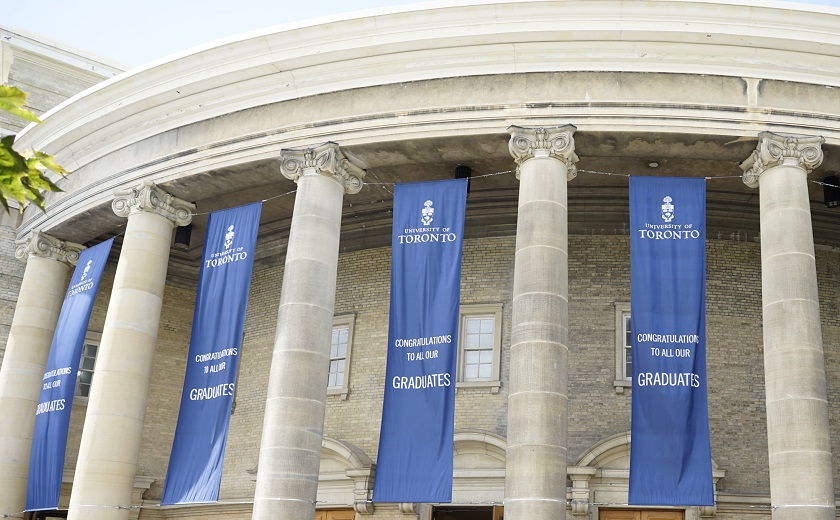In pursuit of his Bachelor of Arts degree, St. Mike’s grad Bay Bahri’s curiosity about the world beyond the classroom led him to discovering where he fits in. His global health courses had him asking more questions. “Every time I was in class, I found myself asking what’s next? How does this affect our livelihoods? How does this play into out in the world?” he says.

He found answers to his questions through a life-changing experience that took him to Athens, Greece. Through his Global Health Research course, he travelled as part of a team of researchers to meet with aid workers addressing the migration crisis in February 2023. There, he was able to conduct qualitative interviews by applying what he had already learned in his classes.
“It affirmed a lot of my personal values in health and healthcare. I’m someone that always likes to explore projects or be involved in initiatives that address what is happening in the world,” he says.
When he returned a couple of months later to check in with those who participated in his research, he also had the opportunity to attend the SNF Nostos Conference 2023, where he deepened his understanding of how health policy can address societal issues. Funded in part by the USMC Student Education Travel Fund, Bay found himself speaking with academics and people with lived experiences about their work in the field of global mental health. In turn, they wanted to hear about his research and his studies at the University of Toronto.
“This was the first time I felt like I was doing work that spoke to who I am as a person, it was an alternative way to engage in academia, and I learned so much through this experience. It was amazing to have this opportunity at the undergraduate level,” he says.
Growing up, Bay did not have much insight into different professional career paths. He came to university knowing he wanted a career in health and assumed he would eventually need to go to medical school. He chose St. Michael’s as his college because he was intrigued by its history as a Catholic college that today welcomes students of all faiths and backgrounds. He wanted to witness how this worked in an academic setting. Through St. Mike’s programming and community, he connected with students of diverse backgrounds who helped him form a more nuanced perception of health.
In his first year, he explored his course options and, when he took an introduction to global health in the human biology program, his eyes were opened to how expansive the field of health really is.
He became motivated to connect his classmates with their program of study. After noticing that, unlike many other programs at U of T, the global health studies program did not have a student association, one of his professors challenged Bay to start one–so he did.
“When founding the Global Health Students’ Association (GloHSA), our work was rooted in the global principles we learned in class: to let the voices of your beneficiaries or end-users determine the programming. At the start there was a lot of surveys, visiting classes, and understanding what students wanted to get out of the global health program and then we did our best to bring them together,” he says.
Under his leadership, GloHSA determined there was a need for a mentorship program to connect upper-year global health students with graduate students at the Dalla Lana School of Public Health (DLSPH) to better understand what a career in global health can look like.
Invigorated by his experiential learning in Athens, he became involved in the Sandbox Project, which allows students in unrelated courses to collaborate on a project. In Bay’s case, he worked with students from the Munk School at a non-profit organization called Access Alliance Multicultural Health and Community Services that is involved in refugee and immigration integration work in Toronto. Through his involvement, he co-authored a paper on ‘ Resilience Mechanisms and Coping Strategies for Forcibly Displaced Youth: An Exploratory Rapid Review’, which outlines recommendations on how to better serve youth coming to Toronto.
Now, as he prepares to graduate on June 13th, he feels confident that his studies and life experience have prepared him for what’s next.
“I remembered when I started at U of T, I was worried if I would find what was right for me. I was exposed to so much and I tried different programs wondering if I would find the right fit and sometimes my confidence would take a hit. Convocation takes that noise and throws it out the window, because it’s a representation that I’ve done it.”
Up next for Bay is graduate studies at the DLSPH, where he will pursue a Master of Public Health degree, with a concentration in Health Promotion . He has also been admitted to the Massey College Junior Fellowship program as a Junior Fellow.
For more on our Class of 2025 graduands :

